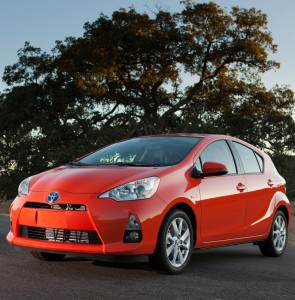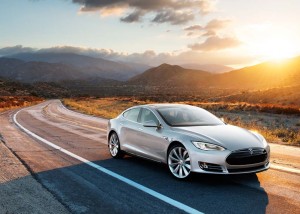Motorists who purchase battery-electric vehicles tend to be younger and more affluent than drivers who buy more conventional hybrid vehicles, according to a new study.
That’s in line with other studies that have found the Tesla Model S has become one of the most popular products among motorists in the nation’s wealthiest zip codes.
“At first glance, one would imagine that consumers purchasing either a hybrid or electric vehicle would be nearly identical; both are environmentally conscious, are of similar ages and have higher income levels,” said Melinda Zabritski, senior director for Experian Automotive. But the data tracking firm found surprising differences.
More than half of the motorists purchasing pure battery-electric vehicles, or BEVs, were between the ages of 36 and 55, according to Experian’s research, with only a quarter of the group 56 or older. But nearly half of those who bought a hybrid are in the older group.

Owners of hybrids, like this Toyota Prius C, tend to be a little older and less affluent than EV buyers.
Meanwhile, 21% of the EV owners had an average household income of $175,000 or more, compared to just 12% of the hybrid owners.
“One possible reason for the disparity could be the growing popularity of the higher-end luxury electric models available,” suggested Zabritski.
(VW investing $27 billion in battery technology. Click Here for more.)
That’s in line with data compiled late last year by data tracking firm Edmunds, which found that the Tesla Model S had become the most frequently registered new car in eight of the nation’s top 25 wealthiest neighborhoods tracked by zip code. That included Atherton, California, zip code 94027, where the average home goes for $6.7 million, and where the Tesla Model S was commanding a 15% share of new vehicle registrations. In nearby Los Altos Hills, it was 11%.
The Experian study also found that motorists purchasing an EV had a higher average credit score of 749, compared to 741 for hybrid owners. Those both rank towards the “Excellent” category, however, according to financial industry average.
Not surprisingly, the typical monthly payment for an electric vehicle was, at $549, about $82 more than what the typical hybrid owner was paying – at $467 a month. That number reflects not only the generally higher price of battery-electric vehicles overall but appears to be skewed by the price tag of the Tesla battery sedan, the nation’s second best-selling electric vehicle, which can run as high as $110,000.
(Bentley shows off plug-in hybrid concept. Click Here to check it out.)
Among the other findings of the study:
- There were children in 44% of EV households, 48% of hybrid homes;
- EV drivers had leases averaging 29 months compared to 35 months for those with hybrids;
- Hybrid owners paid an ever-so-slightly higher interest rate of 2.77% compared to 2.67% for battery-electric vehicle drivers.
Motorists driving battery-based vehicles remain a somewhat exclusive group, BEVS, plug-in-hybrids and conventional hybrids collectively accounting for barely 4% of the U.S. new vehicle market. That drops to barely 1% for BEVs and plug-ins alone. But while the number of hybrids on the road at end of 2013 were up by 19%, according to Experian, the number of so-called “advanced battery vehicles” had surged by 245% compared to the year before.
(Tesla fires back at “Lemon Law King.” Click Here to find out why.)

